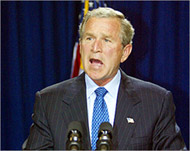Bush defends logic of terror alert
US President George Bush defended his administration against charges that it issued a terror alert in New York and Washington for political purposes and said the government had an obligation to inform the public about genuine threats.

Bush, on Friday, accused by Democrats of using last Sunday’s warning of potential threats to financial institutions to take political momentum away from White House rival John Kerry, said it was important to share “real” intelligence.
“When we find out intelligence that is real, that threatens people, I believe we have an obligation as government to share that with people,” Bush told a sceptical audience at a conference of minority journalists.
“And imagine what happens if we didn’t share that information with the people in those buildings and something were to happen?”
War President
He added: “This is a dangerous time. I wish it wasn’t this way. Now, I wish I wasn’t the war president. Who in the heck wants to be a war president?”
|
“This is a dangerous time. I wish it wasn’t this way. Now, I wish I wasn’t the war president. Who in the heck wants to be a war president?” |
Turning to Iraq, Bush later challenged Kerry, the Democratic presidential nominee, to say straight out whether he would have supported the 2003 invasion if only to eliminate the danger that former Iraqi president Saddam Hussein could have developed weapons of mass destruction.
“Even though we did not find the stockpiles that we thought we would find, we did the right thing. He had the capability, and he could have passed that capability on to our enemies,” Bush said at a campaign picnic rally in New Hampshire.
“Now, there are some questions that a commander in chief needs to answer with a clear yes or no. My opponent hasn’t answered the question of whether knowing what we know now, he would have supported going into Iraq,” he added.
“I have given my answer. We did the right thing, and the world is better off for it.”
No answer
Journalists attending the Unity conference in Washington had given Kerry loud applause when he appeared before them on Thursday, so Bush had little doubt about the group’s political leanings when he agreed to talk to them.
Still, the openly sceptical laughter that greeted some of his answers to their questions was a stark contrast to the fawning crowds Bush usually faces on the campaign trail.
A lone heckler was escorted out of the hall by security after interrupting the president’s opening speech with shouts of “Shame on you, Mr. Bush!” and calling him a liar.
Many in the crowd laughed when Bush struggled to answer a question about what tribal sovereignty means for Native American tribes in the 21st century.
Tribal sovereignty
 |
|
Bush struggled to answer |
“Tribal sovereignty means that; it’s sovereign. I mean, you’re a — you’ve been given sovereignty, and you’re viewed as a sovereign entity. And therefore the relationship between the federal government and tribes is one between sovereign entities,” Bush replied.
The crowd applauded a questioner for asking Bush about his views on whether race and ethnic background should be used in college admissions and hiring. Bush has already stated his opposition to racial quotas in schools and hiring.
“I think colleges ought to use merit in order for people to get in,” he said when pressed by one questioner.
Bush angered some in the African-American community last month by refusing to address the annual conference of the National Association of Colored People. He tried to make it up by speaking to the more moderate Urban League, and Friday’s appearance reflected a White House attempt to reach out to minorities, who voted against him in significant numbers in the 2000 election.